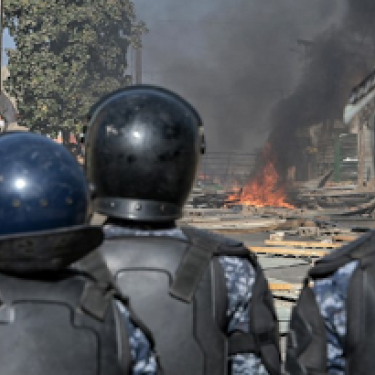Right to information curtailed in Senegal amid protests about poll delay

Reporters Without Borders (RSF) calls on authorities in Senegal to guarantee the right to information and journalists' safety after mobile Internet access and a commercial TV channel’s signal were cut and reporters were aggressed by security forces while covering opposition protests against President Macky Sall’s decision on 3 February to postpone the presidential election.
Senegalese journalists covering politics and unrest have had to endure trying moments during the past two years at least, especially in connection with elections. And now they are being obstructed again over the protests in response to the postponement of the presidential election that was to have been held on 25 February. Disconnecting a privately-owned TV channel’s signal and mobile Internet access and aggressing reporters constitute unacceptable restrictions on the right to information. We condemn these violations and call on the authorities to end them at once and to allow journalists to cover political developments without any risk to their safety.
Mobile Internet access was disconnected on 4 February for the second time in less than nine months. The statement issued by communication minister Moussa Bocar Thiam, referring to the “dissemination of many hateful and subversive messages relayed on social media,” was sadly similar to the one issued last June.
Earlier in the day, gendarmes harassed and aggressed three reporters covering the protests organised by opposition candidates in response to the presidential election’s postponement, announced the day before by President Macky Sall. The gendarmes ignored the fact that the journalists were all wearing vests bearing the word “press” and were all carrying press cards.
Mame Ndack Mbacké, a reporter for the Agora TV press group, and Khadija Ndatté Diouf, a reporter for the privately-owned TV channel ITV, had just interviewed politicians and government opponents when gendarmes arrested them, bundled them into one of their vehicles, and seized their equipment. They were released 30 minutes later.
Teargas was fired twice at Clément Bonnerot, a reporter for the international TV news channel TV5 Monde. “I was filming while walking on my own down the street when gendarmes fired twice in my direction to prevent me filming,” he said.
The privately-owned TV channel Walfadjri was broadcasting a live debate along with images of the protests on the evening of 4 February when its signal was “temporarily cut on the communication ministry’s decision.” The channel was accused of broadcasting live reports from the protests allegedly constituting an “incitement to violence.”
In Senegal, journalists are often the victims of arrests – a dozen were arrested in the course of their work from July 2022 to August 2023 – and attacks by either the security forces or politicians, political activists or their supporters. Cases of abuse of authority have also increased, including an initial suspension of Walf TV’s signal in June 2023 and restrictions on access to the Internet and social media.
